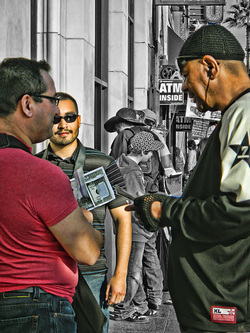When a murderer is executed in the United States, three appeals and 12 years after his crime, society has largely forgotten about him. His death has almost no deterrent effect on crime. Further, a life sentence cannot be executed speedily. In Ex. 21, the death penalty is an appropriate penalty for certain crimes and other examples illustrating true justice and fairness.
Yet, the death penalty as executed through American courts is not much of a deterrent. King Solomon explained why this is so: Because the sentence against an evil work is not executed speedily, therefor the heart of the sons of men is fully set in them to do evil (Eccl. 8:11).
A Hebrew slave shall serve for six years and go free along with his wife on the seventh without payment. If the slave loved his master, wife and children, then his master would bring him to God, pierce his ear with a awl and serve him permanently. A female slave displeasing to her master shall be redeemed as he did not have authority to sell her to a foreign people because of the unfairness. If he took another woman, he could not reduce her food, clothing or conjugal rights (Ex. 21:1-11). Employment and labor law require fair salaries and benefits.
Those who struck a man so that he died shall be put to death but if God let him die, he should have a place to flee. If a man killed his neighbor craftily, he should die. He who struck or cursed his father and mother or kidnapped a man shall be put to death. (Ex. 21:12-17). Homicide or wrongful death cases may require capital punishment so justice is rendered for both offender and victim.
If men quarrel and one is struck, he shall pay for loss of time and take care of him until he is completely healed. An offender shall be punished if a slave dies, but no vengeance taken since he is his property (Ex. 21:18-21). Intentional or reckless conduct by individuals resulting in personal injuries require payment of lost wages and medical bills.
If during a struggle between men, one of them strikes a woman so she has a miscarriage, he shall pay a fine as the judges decide. If there is further injury, you shall appoint as a penalty life for life, eye for eye, etc (Ex. 21:22-25). Reckless endangerment calls for indeterminate compensation and possible criminal penalties.
If a man destroys the eye or knocks out the tooth of his male or female slave, he shall let him go free. If an ox gores a man or woman to death, the ox should be stoned and flesh not eaten, but the owner goes unpunished. If the ox had a habit of goring and the owner failed to heed warnings, and it kills someone, the ox and owner both shall be put to death. The owner shall pay a ransom as a redemption for his life if it gores a son or daughter and the owner will pay a slave master 30 shekels of silver if it gored a male or female slave (Ex. 21:26-32). Intentional or reckless endangerment caused by animals call for appropriate remedies and possible criminal penalties.
An owner of the pit shall make restitution if an ox falls into an uncovered pit. If the ox hurts another so it dies, then they should sell the live ox and divide its price equally and divide the dead ox. If an unconfined ox had a habit of goring, the owner should pay ox for ox (Ex. 21:33-36). Damage to property due to negligence should have appropriate compensation or remedies.
Reflecting on these various crimes and remedies, how does it affect your view of the judicial system? Are certain people favored (those with influence and good lawyers) and those without resources (poor and disenfranchised) taken advantage of?







